- So, can you give your dog raw meat?
- Can dogs eat raw steak?
- Should dogs eat raw meat?
- Can dogs eat raw meat on bones?
- Can dogs eat raw pork meat?
- Can I feed my dog raw ground meat?
- Can dogs eat raw turkey meat?
- Can a dog get sick from eating raw meat?
- Can dogs with pancreatitis eat raw meat?
- Can dogs eat raw meat? The summary
Raw dog diet is controversial. But its popularity keeps increasing.
We have those racing greyhounds on the one side, and sled dogs that were doing fine with the raw food diet for a long time. So, naturally, somebody might have suggested that it could be useful for more domesticated dogs too. And this concept was proposed by Australian veterinarian Ian Billinghurst in 1993. He called this a BARF diet, an abbreviation for Bones and Raw Food, or Biologically Appropriate Raw Food.
Billinghurst stated that adult dogs would flourish on a diet that they were eating before domestication: raw, meaty bones, and vegetable scraps. Commercial pet products based on grain, he argued, were detrimental to the health of a dog.
Many veterinarians, however, disagree, as does the FDA. And the results of some independent studies in the field are definitely should make responsible pet parents think twice before going raw.
Potential benefits of the raw dog food diet that supporters tout MIGHT include: better coats and skin, better teeth, healthier bowel movements, and high energy levels. But let’s look into the other side of the medal.
So, can you give your dog raw meat?
In addition to the danger of nutritional deficiencies, not only does it present a threat to your dog, but, according to extensive FDA research, it might also be threatening to you and your family. Raw meat is probable to contain harmful bacteria such as Salmonella, Listeria, E. Coli, and much more.
Cooking meat at a high temperature kills those harmful bacteria. So, there is always a greater risk that your dog will develop a foodborne disease or another form of bacterial infection by eating uncooked meat.
Also, there is an enhanced danger that you or a member of your family will come into contact with the bacteria and develop a foodborne disease as well. Dealing with the raw meat and your pup after he eats it increases the likelihood of infection.
If you do decide to feed your dog raw, in spite of all the risks and the higher price tag for fresh quality meat, you have to take all the precaution measures described by the US Food and Drug Association in the same study.
Can dogs eat raw steak?
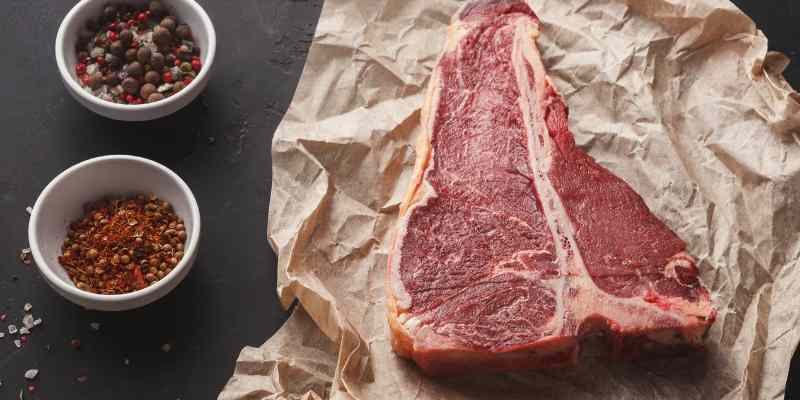
As we’ve established the raw meat, including steak, can plant some nasty foodborne pathogens like salmonella into your family. Especially if the meat was left out for more extended time. This can be particularly dangerous if someone (human or animal) has a disease or is taking certain kinds of medications. Speak to your vet to assist you in determining if raw meat advantages outweigh your dog’s danger of getting sick.
Or stick to the cooked version if you want to share the steak with your dog instead of going to the vet for advice.
Cook the meat in a pan or pot for your canine, or a BBQ until it’s well done. And skip the seasonings as in most cases it’s toxic for your pet.
You can learn more about this topic in our blog post fully answering the question “Can dogs eat steak?”

Should dogs eat raw meat?
Leaving aside all the danger of foodborne illnesses, specialists claim feeding a diet that consists mainly of raw meat may not provide your dog’s full and balanced nutritional needs. This sort of eating can lead to dietary deficiencies and various diseases in your dog.
Since dogs live much longer than wolves and other wild canines, they need full and balanced nutrition to assist them to live a long and healthy life.
If you choose a commercially prepared raw food diet, discussing the move with your vet would still be a good idea.
You might also like:
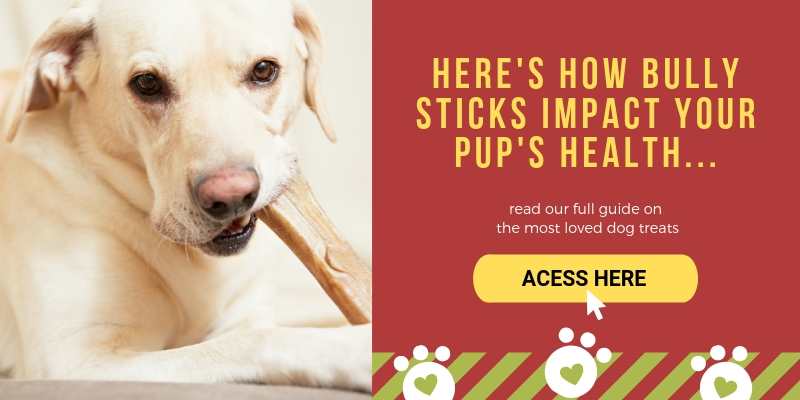
Can dogs eat raw meat on bones?
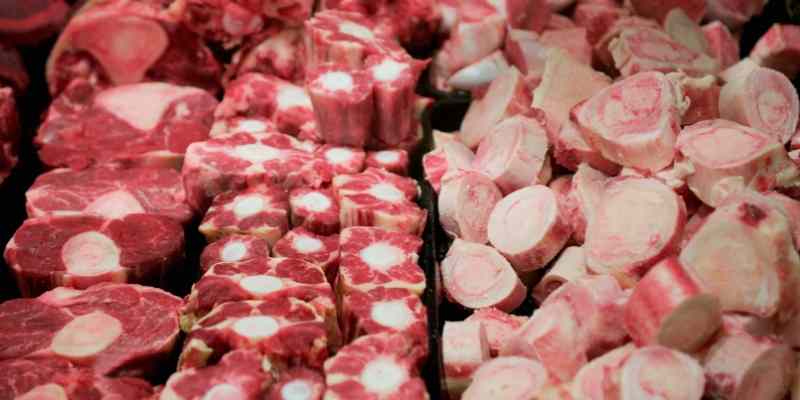
Those who are feeding their animals with a diet, claim that bones containing meat and fat on them are useful for dogs because they are breezy to digest and do not break like cooked bones.
But whatever they say there is a vital downside with raw bones, they can carry bacteria such as salmonella or e-coli, mainly if they are not eaten within a few days.
Skip the smaller bones as they pose a more immediate danger of choking. Be aware that any bone can cause a dog’s digestive disruption.
Cooked bones tend to break, and if the dog vomits, this can lead to broken teeth and possible colon or neck perforation.
Any bone has to be given under supervision only, so you can watch what’s going on with your pup and make sure he or she is okay even if the bone breaks into small parts.
Raw bones are much safer than cooked when it comes to choking. But here’s a piece of guidance from Dr. Karen Becker. She advises that you pick a bone approximately the size of your dog’s head if you want to give that bone to your dog. That size decreases the likelihood of your dog breaking down the bone and swallowing a piece.
If your dog gets into difficulty eating bones, we recommend that you visit the doctor of the pup quickly.

Can dogs eat raw pork meat?
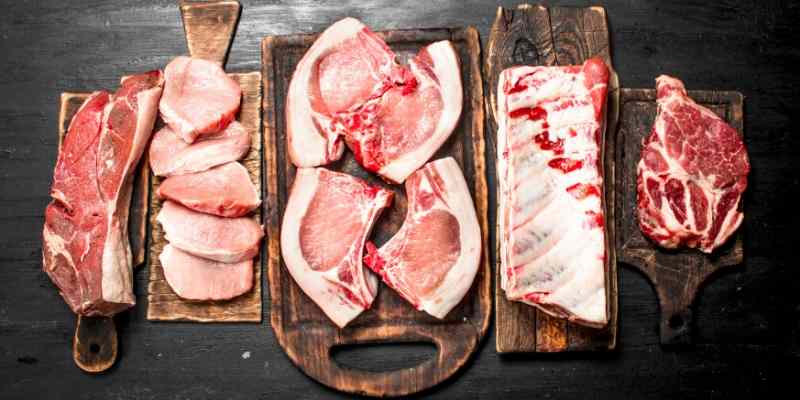
There are many issues with pork, aside from being extremely fatty (the direct path to pancreatitis).
Most of us learned that sharing the pork with the pup might be hazardous due to the “meat worm” called Trichinella spiralis. It causes trichinosis, a parasitic disease in both dogs and humans. There are usually no symptoms of the condition in pups, and it often goes undiagnosed. But it can be damaging, followed by very serious inflammation of the body muscles as the parasite settles inside multiple body tissues.
Puppies generally have a greater risk of contamination than cultivated dogs. For example, some other bacteria discovered in pork, Yersinia enterocolitica also sits in our bodies for years, doing nothing. However, as it has been established, it can trigger the growth of multiple inflammations, e.g. arthritis.
You can learn more about pork and dogs in our full guide on the topic here.
Can I feed my dog raw ground meat?
You can, but you probably shouldn’t, as with any other raw meats. According to the American Veterinary Medical Association (AVMA), raw meat may include a range of harmful bacteria and microorganisms, such as salmonella or listeria.
The risk of a raw dog diet for humans is even greater and can be decreased if you are going to clean the pet’s dish right after the mealtime is over. Dogs are less probable to be affected by raw meat pathogens, but they can still pass it on to us.

Can dogs eat raw turkey meat?
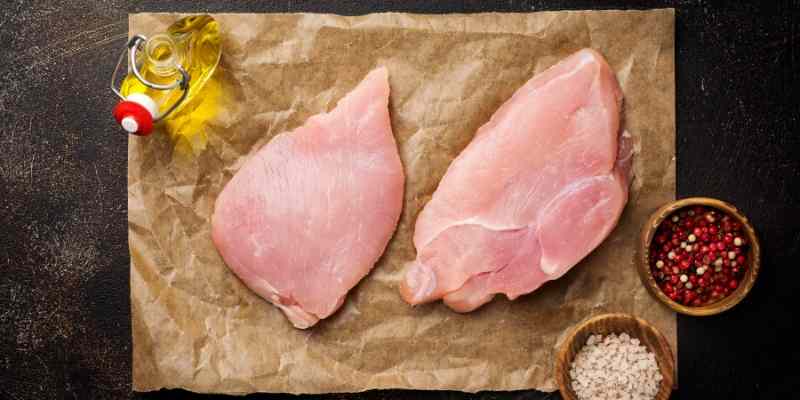
No, never. Although from a nutritional perspective it seems good: according to the USDA Food Composition Database (US Department of Agriculture), 100 g of raw turkey has 115 kcals, 22.64 of protein, 1.93 of fats, 11 mg of calcium, 0.86 mg of iron, 27 mg of magnesium, 190 mg of phosphorus, 235 mg of potassium, 1.84 mg of zinc.
However, we are all conscious of the incidence of parasites in poultry meat. Let’s check the recent research from 2018 about the prevalence of pathogens in poultry meat.
According to this research, microorganisms called S. aureus were found in 43.1% of all randomly checked samples of poultry purchased in various countries. And Campylobacter was found in 23% of the range.
Tiny research of client-owned dogs discovered that 80% of pups eating raw poultry were positive for Salmonella serovars, while zero dogs following the commercial diet were positive.
That being said, most plausible you won’t like your pet anywhere close raw turkey.
You can learn more about feeding your dog with turkey (raw or cooked) in our comprehensive guide on the topic here.
Can a dog get sick from eating raw meat?
It’s definitely possible. But ‘don’t panic ahead of time. First, watch your pup for the next 24-48 hours. Look for symptoms such as muscle pain, vomiting, diarrhea, stiffness, and anything else that might seem strange.
If your dog demonstrates any of these after eating raw meat, organize an appointment with your vet as soon as possible.
You might also like:
Can dogs with pancreatitis eat raw meat?
Most types of meats are high in calories, fat, proteins, and cholesterol. In fact, dogs overeating high-fat may develop high cholesterol or pancreatitis. So if your pup is already struggling with this condition, the raw meat may make things worse.
This diet is also quite dangerous for dogs with kidney diseases or liver failure. Also, dogs with cancer or other immunosuppressive illnesses should not eat raw. And puppies are not well suited for raw either.
Can dogs eat raw meat? The summary
Raw meat diet is certainly not for every single dog out there, and it’s a bit contentious overall.
Better skin, teeth, and coat, more energy, healthier bowel movements are among its potential advantages.
Potential dangers include choking hazards, multiple possible health risks due to the dietary imbalance of such a diet, and threats from raw meat bacteria to humans’ and dogs’ health.
You might also like:
There is a higher risk that your dog will develop a foodborne disease or another form of bacterial infection by eating uncooked meat.
Besides, there is an enhanced danger that you or a member of your family will come into contact with the bacteria and catch a foodborne disease too. Handling raw meat, letting your dog lick your face, cleaning pup’s feces, or touching any contaminated surfaces improve the likelihood of infection.
If you still believe that the raw diet is the right choice for your pup, remember that it is essential to feed high-quality meats only. Buy fresh-looking and smelling meats. Preferably from the finest butcher around. And last but not least: always seek guidance from a pet nutritionist or the vet you trust before making any adjustments from the regular dog’s diet.
Thanks for the blog graphics: Canva.com

